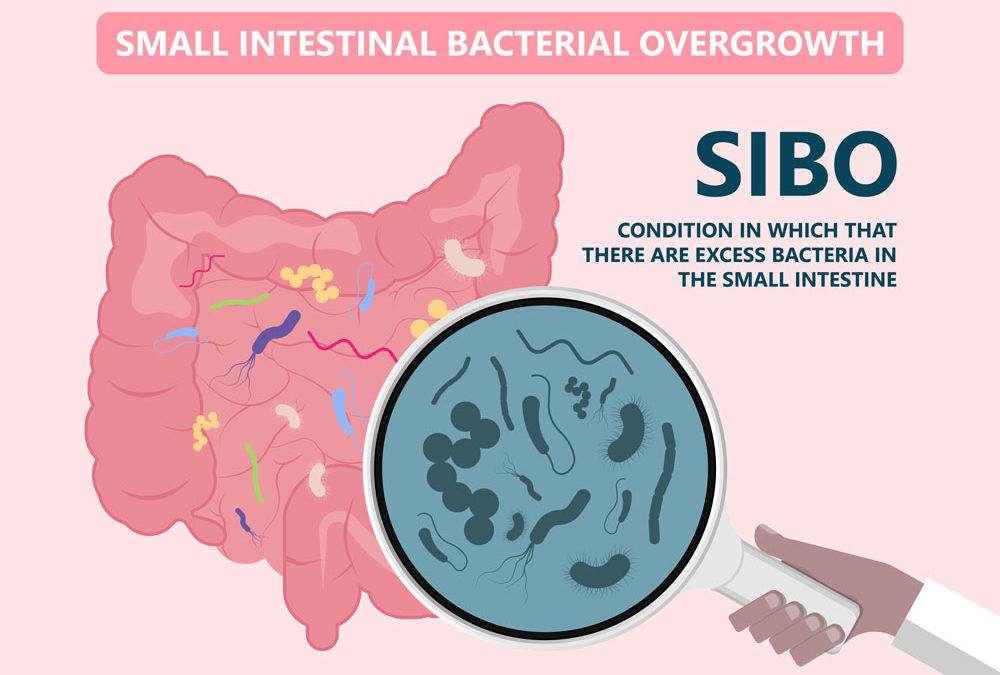Bloating is one of the most common symptoms associated with small intestinal bacterial overgrowth.
If your bloating worsens anywhere from 30 to 100 minutes after eating, it could be a sign that you have an overgrowth of bacteria in the small intestine due to early carbohydrate fermentation.
An overgrowth of bacteria in the small intestine leads to fermentation of certain carbohydrates and high fibre foods such as apples, garlic and onion causing gas and bloating as soon as the food leaves the stomach.
In this article we delve into small intestinal bacterial overgrowth, how you may have got it, other symptoms associated with SIBO and how to treat it.
What Causes Small Intestinal Bacterial Overgrowth?
Did you know that the most common cause to small intestinal bacterial overgrowth is food poisoning?
When food poisoning occurs it can initiate auto-antibodies that attack the intestinal lining paralysing the migrating motor complex (MMC).
The MMC’s main role is to act like an internal housekeeper sweeping bacteria and food from the small intestine down to the large intestine.
With this mechanism impaired it allows bacteria to overgrow where it shouldn’t be initiating SIBO.
Other common causes to SIBO include:
- Adhesions from abdominal surgery
- Antibiotics (particularly recurrent use)
- Celiac disease
- Hypothyroidism
- Low stomach acid
- Poor bile flow and low pancreatic enzyme production
- Moderate alcohol consumption (one – two per day)
- Oral contraceptive pill
Symptoms of Small Intestinal Bacterial Overgrowth
The symptoms associated with SIBO vary depending on what type of bacterial overgrowth you have and what type of gas is being produced.
Below I have outlined three different types of SIBO and their associated symptoms. If you have a combination of gases being produced, you can have multiple symptoms which makes it difficult to pinpoint what type of SIBO you have without testing.
This is why I always recommend SIBO breath testing before undertaking treatment.
There are three types of SIBO:
- Methane
- Hydrogen
- Hydrogen sulfide
- You can also have a combination
Symptoms associated with methane:
- Bloating
- Belching
- Constipation
- Nausea (retrograde motility)
Symptoms associated with hydrogen:
- Diarrhoea
- Alternating diarrhoea and constipation
- Cramping
- Fibromyalgia
Symptoms associated with hydrogen sulfide:
- Diarrhoea (small intestine)
- Constipation (large intestine)
- Foul gas
- Bladder pain
- Joint pain
How do you treat small intestinal bacterial overgrowth and bloating?
Your treatment will depend on the type of small intestinal bacterial overgrowth you have, the underlying cause to your SIBO and the severity of it.
Generally when it comes to treating SIBO your treatment will comprise of the following:
1. Initiating a tailored nutrition plan
This is essential to minimise the types of food feeding the bad bacteria depending on the type of gas that comes back on your SIBO breath test. As your gut health improves your diet plan will change, adding in more and more foods.
The goal is to always increase the diversity of your food as much as possible by the end of treatment so that you can enjoy a diverse, whole foods diet without the bloat, gas and alternating bowel habits.
2. Supporting digestion and stomach acid production
Low stomach acid and pancreatic enzyme production is a common problem in SIBO and can be a contributing factor to it returning. This is often due to high stress, anxiety, eating on the run and mindless eating.
Stomach acid aims to ‘kill off’ bacteria that could potentially be present in the food you are eating. Without adequate levels it will allow more bacteria to move into the small intestine, set up shop and exacerbate your symptoms.
This will be considered in your treatment plan.
3. Weeding the bacterial overgrowth
- Berberine containing herbs such as phellodendron, chinese goldthread and barberry
- Garlic
- Oregano oil
- Horopito
- Pomegranate
4. Healing the small intestine/leaky gut
Small intestinal bacterial overgrowth can cause leaky gut syndrome and inhibit the absorption of important minerals such as iron and zinc.
It’s not uncommon for those with long term iron deficiency (even with the consumption of red meat weekly) to have small intestinal bacterial overgrowth as the root cause of this.
Once SIBO is treated and leaky gut is healed, with the support of herbs and nutrients such as aloe vera, boswelia, turmeric, glutamine, zinc and vitamin A iron absorption increases and iron deficiency is rectified.
5. Supporting the migrating motor complex and preventing relapse
Unfortunately it’s not uncommon for SIBO to return if the underlying cause isn’t addressed.
That’s why it’s essential to support the migrating motor complex up to 6 months post treatment (especially if food poisoning was the underlying cause) to prevent relapse.
Blog Posts You May Like

Get Your Fibre Fix: The Key to Hormone Health and Happy Guts
Are you struggling with hormonal imbalances or digestive issues? Believe it or not, the solution could be as simple as adding more fibre to your diet. Fibre is a type of carbohydrate found in plant foods that not only supports gut health but also plays a crucial role...

4 Steps to Treat IBS Naturally
It can be incredibly disheartening when you hear your doctor tell you to simply live with the symptoms of Irritable Bowel Syndrome (IBS). In fact, for many individuals, this can be one of the most frustrating and discouraging experiences they face while trying to...

A Clients Story – Finding the Root Cause to Chronic Nausea & Period Pain
"My health journey began in 2002 after contracting gastro from my partner at the time. After being violently ill for about 10 hours it took about 5 days before I could eat again and before I felt "ok" again. I never truly felt like myself or "normal" after that. The...


